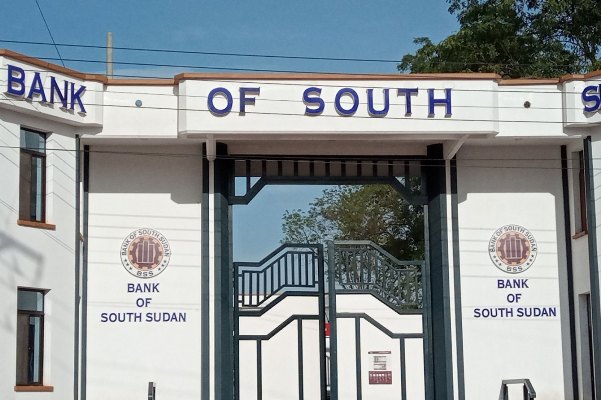
Central Bank gate. | File/Courtesy.
The National Parliament has today passed the Bank of South Sudan Act 2011, Amendment Bill 2023, and changed the name of the country’s currency unit from ‘South Sudanese Pound’ to ‘South Sudan Pound.’
It also passed the Banking and Other Financial Institutions Amendment Bills 2023.
The Bank of South Sudan Act 2011 is amended to conform to the 2018 peace deal and Article 182 of the transitional constitution.
The article maintains the establishment of the Central Bank dubbed as the Bank of South Sudan.
It is mandated to provide banking services in accordance with the constitution and laws and acts as an independent corporate legal entity.
Changkuoth Bishock, the Chairperson of the Standing Specialized Committee on Finance and Economic Planning explains to the August House the changes made in the amended act.
“We have made all the changes in this document. During the second reading, we distributed this document, and everyone has it and all the chapters, the deleted and whatever is done, is in this document.”
“In section 46, this ‘Sudanese’ is deleted throughout the bill, and we replaced it with the word Sudan. So, the pound will be called the South Sudan Pound, not the South Sudanese Pound”.
However, lawmaker Charles Majak has opposed the changes arguing that South Sudan does not own the resources but its people.
According to him, the currency should have remained as South Sudanese Pound.
“Why would you delete Sudanese and put Sudan, that is to say, South Sudan? South Sudan does not own the resources,” Majak argued before the bill was passed.
“It is the people who own the resources, and they are living within an international border in a place called a country called South Sudan.”
“Here it has been maintained. My question now for argument because I have put my reason is to the chair to tell me and to convince even the house, why did you cancel Sudanese?”
On his part, the Bank of South Sudan Deputy Governor Adis-Ababa Othou said the change of the currency name is adopted from the region.
“The practice in the region when it comes to currency, is to name the currency to the country,” he told the House.
“So, in Kenya, the unit of the currency of Kenya shall be called Kenya shillings. It’s not Kenyan shillings but it is Kenya shillings and then Uganda shillings, so, that’s why we are changing from South Sudanese Pound to South Sudan Pound.”
– Financial reforms –
The roadmap for the implementation of Chapter Four of the Revitalized Agreement on Resolution of Conflict in the Republic of South Sudan (R-ARCSS) indicates that the transitional parliament should decide on the nomenclature of the Bank of South Sudan, or BoSS.
The Presidency is also to ensure the statutory and supervisory independence of BoSS, its leadership, and the composition and appointment of the board.
The unity government, particularly the Ministry of Finance and Planning, is tasked with reviewing and implementing the strategic economic development of the roadmap.
The roadmap further tasks the Presidency to nominate the head of Anti-corruption Commission and forward to the legislature for approval. It is not clear if the commission has reconstituted, since the parliament is still on recess.
The NCAC, R-TGoNU and R-TNLA are also tasked with reviewing the National Audit Chamber Act 2011 and guarantee its independence.
The Ministry of Petroleum, Audit Chamber, and R-TGoNU are to identify, check and record all loans and contracts collateralized against oil.
Ministries of Petroleum and Public Service and R-TGoNU are to review all current employment in the oil sector.
Ministry of Petroleum, Ministry of Finance and BoSS are to enforce the law and procedures of the Ministry of Finance and Planning on the remittal of oil revenue including surface rentals, training fees, and bonuses among others.
Ministry of Finance and Planning, Ministry of Petroleum and Anti-corruption Commission are to ensure prudent management of the oil stabilization account, and future generations’ fund, in accordance with the revised Public Finance Management and Accountability Act.
Ministries of Petroleum, Mining, R-TGoNU and stakeholders are to ensure community participation in the decision-making process regarding the awarding of contracts and use of natural resources.
Audit Chamber, R-TGoNU and R-TNLA are to review and audit the previous allocation and transfer of the 2% and 3% made to oil producing states and communities since 2011.
Support Eye Radio, the first independent radio broadcaster of news, information & entertainment in South Sudan.
Make a monthly or a one off contribution.
Copyright 2024. All rights reserved. Eye Radio is a product of Eye Media Limited.